UHasselt x The Value Hub. Building bridges between university & business.
9 minutes
our services

At The Value Hub, we love to share our practical experience and expertise with the experts of tomorrow. And we practice what we preach; the Data Science project and our collab with UHasselt is the best possible example. In this research project, we introduced companies to the data scientists of the future. How does such a collaboration work? Read all about it in the interview with the professors, students and one of our partner companies below!
Prefer the Dutch version? Find it on the website of UHasselt (click)!
About the Data Science Project
In a world where data is the new gold, data scientists play a crucial role in mining valuable insights and information for every company. "To prepare the master students for this challenging task, UHasselt introduced an innovative education program. What did it include? Analyzing and interpreting real company data to solve concrete company problems." And if we have to believe prof. dr. Dirk Valkenborg and dr. Simon Appeltans, it was an inspiring learning experience, for both the students, the companies and for themselves.
Research meets market
What inspired you to introduce this new subject?
DIRK VALKENBORG: “As a part of our permanent evaluation cyclus, we organize a 'soundboard' with alumni and organizations to ensure the relevance of our program. This showed us that, however our students excel in data science, the business (experience) part and communication skills stay behind. How to prepare them better? By diving into the real life. That's why we wanted to create a subject that gives them the opportunity to work with real life challenges from real life organizations. On top of that, this new way of learning should make them more familiar with the complexity of different kinds of business processes. An experience in which they are really immersed in that business reality, but in a safe haven to be able to experiment. Trial and error, let's say. A subject that's not only valuable for our students, but for the companies too."
Civic education at its purest.
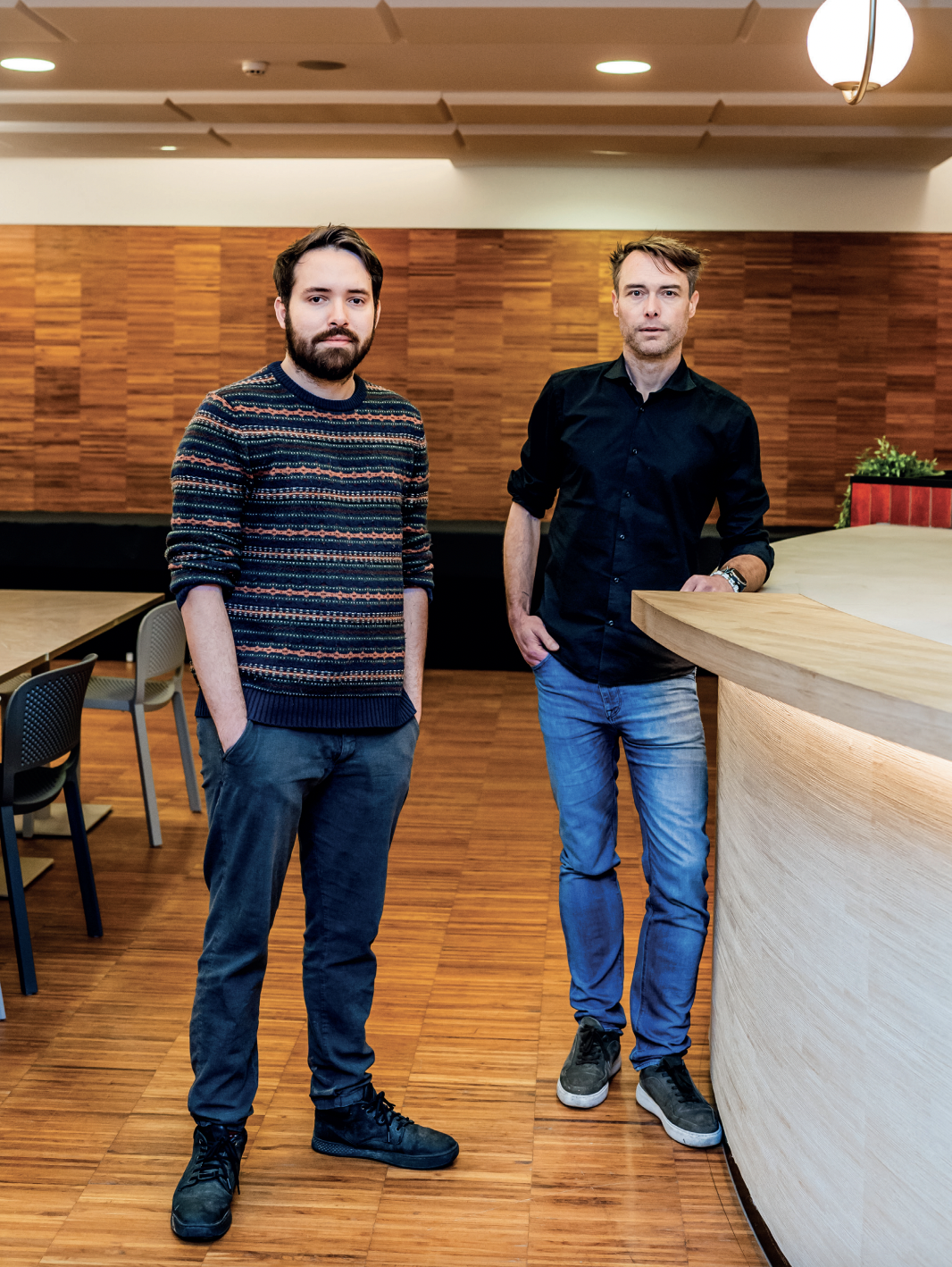
SIMON APPELTANS: "That wasn't an easy exercise to make. As academic researchers, we can easily support our students on the science side of the story, but we often lack some practical experience too. To simulate a realistic organizational context, we asked The Value Hub to guide us. They have plenty of experience in supporting organizations in a sustainable, digital transformation, and they know the educational field."
How did the Value Hub respond to this innovative idea?
DAAN JORDENS: "We were immediately enthusiastic, because the problem sounded familiar. It's always a challenge to offer students - in an academic setting - real on-the-job experience. Even in a master thesis that handles a specific company case, the accent is inevitably more on the content than on those enduring competencies. That's why it was crucial to find a way to mimic that real-world business environment as good as possible, so that students don't only learn how to analyze and interpret real business data - because they already can - but also how to communicate those findings effectively.”
Innovative insights for the logistic industry
You especially focus on organizations in logistics.
DAAN JORDENS: “We knew from experience that many logistics companies struggle with capacity planning, and have difficulties to accurately determine how many staff they need in their warehouses. Although data analytics can help make accurate assessments, many companies today lack that experience, so decisions are still often made on gut feeling. With this project, we were able to show these companies what insights students from the second master could extract from their data. We put out a call and organized a launch event for interested companies.”
DIRK VALKENBORG: “To our surprise, in no time, sixteen companies from home and abroad applied. And the companies were willing to pay for our students' insights. That confirmed that our questions really responded to real needs in the field.
SIMON APPELTANS: "We ended up selecting three companies, each operating in a different market segment and consequently no direct competitors to each other: Casa International, Scania Group and Livlina.
Data dynamics
How did you start?
DIRK VALKENBORG: “Based on the results of a personality test, we put together complementary teams, which were each assigned a company. The groups were particularly diverse: a mix of Belgian and international, full-time students and working students, on-campus and distance-learning students joined forces to meet this challenge. This diversity greatly enriched the dynamic.”
DAAN JORDENS: “We kicked off with an online Design Sprint, a series of workshops spread over four days. Using this structured method, we defined, together with the students and the partner companies,
the problem statement and determined a specific research question for each company. This was a crucial step.
We then paired the students in groups to their companies and provided them with extensive data sets, which they got to work with. At the end of this process, they presented their analyses, interpretations and recommendations.”
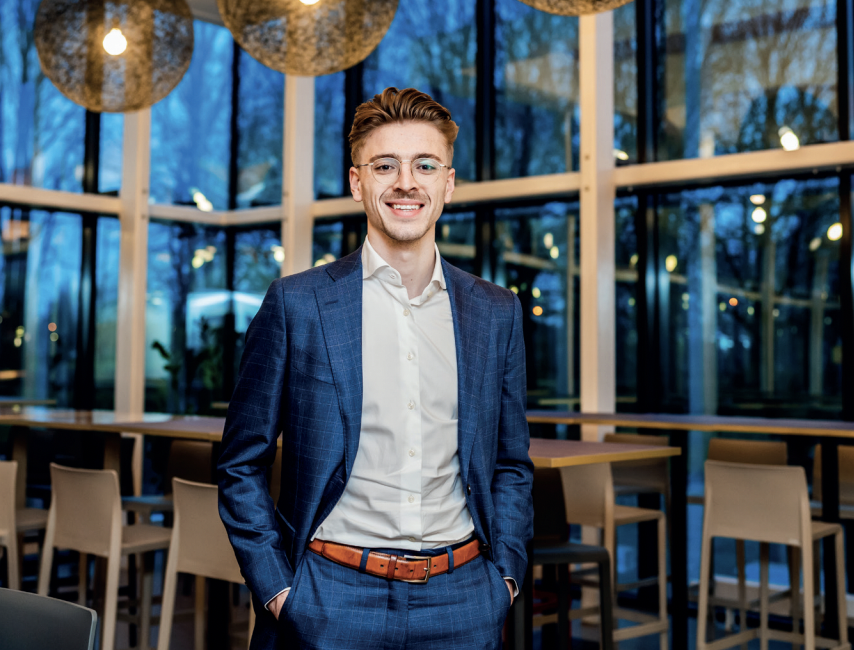
SIMON APPELTANS: “It was an enormously intensive process for all involved. Every week, the students sat down with the representatives of the companies to discuss their progress and verify whether they were on the right track. And every week progress was expected. That increased the pressure immensely.”
DIRK VALKENBORG: “In addition, we organized peer review sessions in which the students shared their process with their professors and fellow students. What problems did they face? What models did they use? And was their strategy the right one? They learned a lot from that too.”
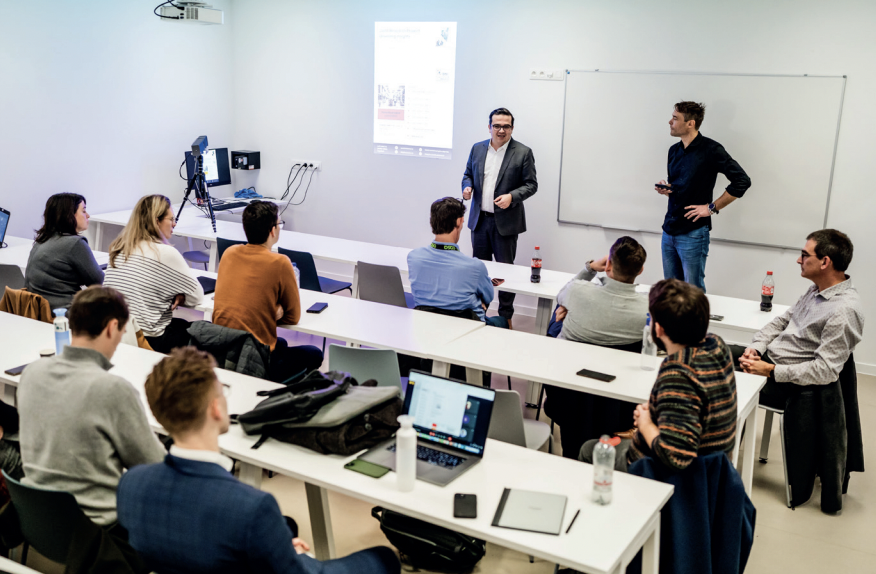
Data impact
To be continued?
DAAN JORDENS: “The project was a huge succes. Companies were very enthusiastic about the students' findings, and were sometimes even able to implement them directly into their business practices. The students made tremendous growth, not only in terms of Data Science in practice, but also
in terms of soft skills. Some teams presented their final findings at a level that almost rivaled a professional consulting firm. We had not dared to dream at the start.”
SIMON APPELTANS: “Although we don't know yet what business challenges we want to present our students next academic year, one thing is certain: we will continue this initiative and expand it further
to other sectors. We may even involve other programs in the future, to involve our students in multidisciplinary teams to look at real business challenges."
The project according to students
This was an advanced communication and teamwork course!
“Heavy, intense, but really engaging and educational.” That's how master's students Entzi Rakipi and Julien Colot describe the Data Science Project. “Of course we are used to distilling relevant insights from data, but when you suddenly get to do that for a real company - with real challenges AND real data - it becomes a completely different experience.”
From the classroom to the field
What were your expectations?
JULIEN COLOT: “Being the first 'batch' of students for this project, we didn't really know what to expect. At the start, I - as a working student - was especially a bit nervous because I realized that this would require an enormous amount of dedication and hard work.”
ENTZI RAKIPI: “I was surprised - and even shocked - that we would be working with real business cases. The intensity and responsibility were also higher than I expected. Yet I quickly saw the added value. This was a unique opportunity to gain real business experience.”
Was it difficult to work with real company data?
ENTZI RAKIPI: “Data-wise, it wasn't that hard. For our team, the biggest challenge was the limited amount of available data. After all, Livlina is still a young company.”
JULIEN COLOT: “We had more than enough datasets, but they were not always as perfect as in our courses, and sometimes more difficult to interpret. To tackle that challenge, we first had to understand Casa International's business processes. The weekly meetings with IT manager Robin were invaluable.”
A master in teamwork
But the true challenge wasn't about data science itself?
JULIEN COLOT: “Especially the intensity made this project challenging. In barely ten weeks, we had to develop a predictive model, while we were still taking other courses and we were not working internally in the company. Every week there were meetings: with the company, with our professors and with our team members. And the pressure was high, because we had to make progress every time. Communication and teamwork were crucial, but working together is - especially when the pace of work is so high - not always easy. Sometimes it was an exercise in diplomatic communication.”
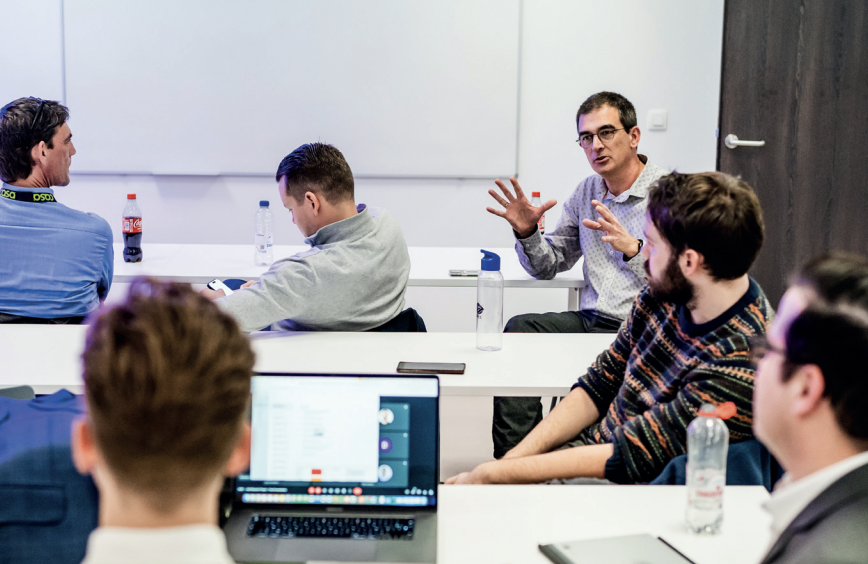
ENTZI RAKIPI: “And in empathy and patience. Our team consisted of students with very diverse nationalities and backgrounds. These mutual differences did not always make it easy. And when team members are in different time zones, even scheduling meetings sometimes becomes a challenge. After this project you actually deserve not only a master's degree in data science, but also in teamwork, I believe.”
Growth opportunities multiplied
Were the hard efforts worth it?
JULIEN COLOT: “Absolutely. It was great to formulate the results with my team during the final presentation. Even though our model was not perfect at that time, there was a sense of relief and pride. Casa showed great appreciation for our efforts and results. After the project we further refined our model. Realizing that they will soon be using our results: that's the cherry on top!”
ENTZI RAKIPI: “That final presentation was really the icing on the cake. You are very proud of what you have achieved together - despite all the difficulties along the way - and especially when you feel that the company you worked with is impressed by what you have achieved. The satisfaction is indescribable.”
The Data Science project from the point of view of Casa International
How do you get more out of your data? That's what this project showed us.
“How can you use data to optimize capacity planning in your warehouses? The research question that UHasselt and The Value Hub presented caught my attention immediately, because we face that challenge too. Although Casa International has immense amounts of data, we are still using it far too little to optimize our processes,” IT manager Robin Van Elsen explains.
External eyes on our data
“There was absolutely no shortage of data at Casa International. For 35 years, everything has been recorded down to the smallest detail. And yet we still do very little with that data. Most of the processes in our warehouses have barely changed over the past decades, and many decisions are still made made on gut feeling.”
We never dared to hope that the students would develop a tool that could be used immediately, in barely ten weeks.
“As an IT manager, you don't have to convince me of the power of data and AI, but sometimes it is quite difficult to convince others within your organization. Unknown is often unloved. So this project came as a gift. It offered us the unique opportunity to have external eyes - of students who don't know Casa - to look at our data. What insights would they extract? How quickly would they be able to identify certain challenges? And could they also show us how we could target our data to improve our processes? I was curious about that."
Ready-to-use
“We had not determined a specific research question beforehand. We mainly hoped for meaningful insights. We had not dared to hope for this outcome. The fact that the students, in just ten weeks, would effectively develop a tool that could be used immediately, that's quite something.
With their tool I can now - on the basis of problems in our processes - identify concrete optimization possibilities and convince others of the need for certain change processes. At Casa, everyone is now convinced that this is the way forward. At this point we are automatically feeding the tool with new data to further refine the system,” Robin Van Elsen explains.
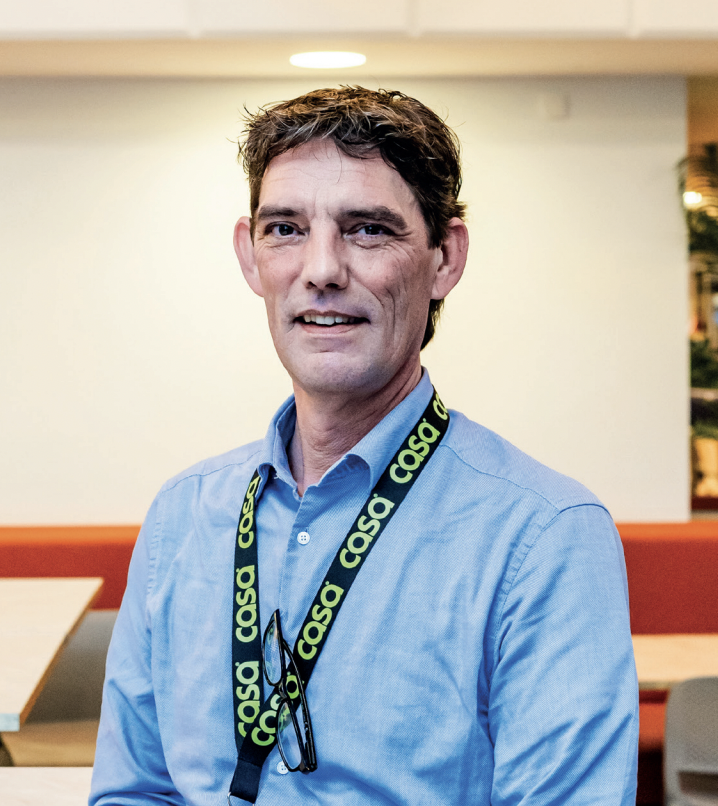
“I am really excited about the student team that worked on our case. Despite the high pressure, the tight time schedule and the complexity of the challenges, they kept striving for excellent results. Their dedication was impressive. Even after the completion of this project, they continued to work on improvements in the system,” underlines the IT manager. “This project was a learning process for them, but they went through it fantastically. Every week we saw them grow during our meetings. They became more confident, communicatively stronger and more business-minded.”
Data is gold
“I can only wholeheartedly recommend it to any company that works with large amounts of data, and that's what I do. When I recently introduced a group from Voka through our company, I immediately spoke enthusiastically about this project. It is impressive what valuable insights fresh, data-powered eyes can offer. At Casa International, we are also convinced after this project that we could use the data scientist profile in our organization. Data are the new gold, and data scientists know better than anyone else how to mine that wealth of insights.”
Click here to read the original interview in Dutch in the UHasselt Magazine.
The services that we provided:
At the start or already up and running? The co-creation starts wherever you like.
Get in touch
arrow_forwardWe proudly create value for









